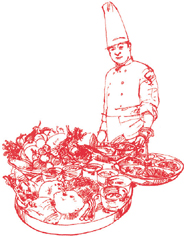
Eating out is very popular, and is the favorite way to socialize. “The more the merrier” is the general rule, and there will often be ten to fourteen people sitting around a table for an office lunch or family meal. The tables in Chinese restaurants are geared to this size of party. It is customary to order as many dishes as there are participants, which gives a lot of variety, and a “lazy Susan” in the middle of the big round table ensures that everyone can reach the food and help themselves to every dish. Dim sum may be ordered at lunchtime (see Cantonese Food, in Chapter 7, and The Banquet).

Smaller social lunches or other meals may take place not in a Chinese restaurant but in one of the myriad others. Thai and Italian food are both very popular, and the tables are of a normal Western size, so two to six diners can eat more intimately and comfortably together.
The smarter hotels and restaurants add a 10 to 15 percent service charge to the bill, but it is usual to leave an additional tip of a few HK dollars to the room staff or waiter, and this will probably go to the individual rather than into a common fund. In ordinary restaurants where no service charge is added, most people leave five or ten HK dollars, or add between 5 and 10 percent to the bill. Western-style coffee shops don’t add a service charge, but there is usually a “tips box.”
Most taxi drivers don’t expect a tip, but it is usual to round the fare up to the nearest HK dollar, or the nearest five dollars on a longer journey. There are standard extra charges for baggage and late-night trips.
In general, if you have received better-than-average service, give a tip—it will be welcomed.
It is not common for Hong Kong Chinese to entertain at home. However, it may happen. Guests should arrive on time, and leave relatively early. A suitable gift for the host would be a bottle of good Scotch or brandy, with some candy or cookies. These should all be decoratively wrapped. Don’t expect your host to open what you bring—this is regarded as greedy and impatient. Likewise, if someone gives you a present, do not open it immediately, or in their presence. Put it on one side to open later, and thank the person next time you see them.

Often a modest host and hostess will deprecate what they have, and apologize for the food. Your job as a good guest is to praise the food, so an equilibrium is reached. Beware of praising an objet d’art excessively in someone’s home, in case the host feels an obligation to give it to you!
If you meet people from a large company, they may have other means of entertaining you at their disposal. One big perk is the junk, which is no longer a picturesque sailing vessel but a motorboat with a wooden superstructure holding up to forty people. The junk trip used to be mainly an expatriate diversion, but has grown in popularity with other groups. Trips are made on weekends to outlying islands, where drinks and lunch are served at anchor. Swimming and sometimes other water sports are available. You may also be invited in the evening to take a junk trip to an island famous for its seafood restaurants. It’s a very pleasant way of getting out of the city, and on a warm evening you will have a beautiful view of the city lights.
Another organized outing might be to the races. Horse racing is something of an institution in Hong Kong. Everyone seems to go, although children are not allowed. The tracks are flat, and the races short, but the amount of money gambled on one race can be phenomenal. Hong Kong ranks third in the world in total betting (about $10 billion a year), after Japan and the United States. Bear in mind that Japan’s betting covers nearly 24,000 races a year, and America’s 55,000. Hong Kong has about 700 races all told.
The lower reaches of the stadia (there are two, one in Happy Valley and one in Sha Tin) house a pushing, noisy crowd and several flourishing food and drink stalls. The upper reaches, where a business bigwig might have a “box,” are very different. Each box is in fact a suite of rooms with a private viewing terrace, and superb catering is usually provided. If you are enjoying your meal so much that you do not want to get up to go to the viewing terrace, you only have to turn your head to see one of the special televisions installed for those in the boxes. If you step outside the box, you can place bets with calm, uniformed women reminiscent of bank tellers. A poker face is necessary in Chinese society. Whether you win or lose, it is prudent to remain passive.
Another outing might involve a cultural show, for example Cantonese opera, although this is an acquired taste and lasts for four hours or more, so many Chinese businesspeople would not expect Westerners to appreciate it.
The word “banquet” is barely used in Western entertainment, but it means something quite specific to the Chinese. It is a formal Chinese dinner, sometimes for one table but very often for several, hosted by one person or a company. The menu is planned in advance, and copies of it will appear on each table so the guests can pace themselves. Normally, twelve or fourteen courses are served, following a certain order, although individual dishes may vary. Nearly every dish contains protein, so at one banquet you may have as many as twelve different types of meat, poultry, and fish. The dish is served into individual bowls, and the bowls are handed to each guest. When each course is ready to be eaten, it is usual to drink a toast to it. Watch everyone else and try to imitate them. Hold your glass up in your right hand and support it at the bottom with the left, and make a circular gesture around the table, making eye contact where possible. Then take a sip—whether it be tea, soda, beer, or brandy. Then pick up your chopsticks when your host does, and enjoy the food.

First comes a dish of cold cuts, sometimes with a few salad vegetables. After this, dishes such as whole steamed garoupa (grouper) and bird’s nest soup will appear, one by one. Sometimes an honored guest will be given a choice morsel by the host, and needless to say it should be received with thanks and eaten with pleasure. This can be difficult if the dish is one that is unfamiliar, such as chicken’s feet with pork fat, but an attempt should be made to eat some of it. It is expected that you will leave something in your bowl, so that you do not look greedy for more.
A banquet shows how wealthy the host is, so rice and noodles are served only at the very end, in case anyone is still hungry. It is quite polite not to eat either of these; in fact it would be impolite to finish your bowl, as it would imply you have not been well fed and want more.
The very last course may be a sweet dessert, but is often an orange, which is served whole with the peel on. It is the signal for the end of the banquet, and hosts will get up after they’ve had their oranges. When your hosts go, you must too, even if you haven’t had time to eat the orange. The hosts will stand at the exit to the room and guests thank them, by putting their hands together and bowing slightly, or by shaking the right hand of the host with both hands and bowing.

Using chopsticks is an art that it is worthwhile to acquire. Hold the top chopstick about half to two-thirds down, like a pencil. Then fit the second stick in between the third and fourth fingers and manipulate this in a pincer movement to pick up the food. This is comparatively easy with pieces of meat or a leafy vegetable, but peanuts and similarly smooth, round objects present quite a challenge. Note that if you are not being served by a waiter, taking food from the center of the table with your chopsticks and putting it directly into your mouth is regarded as impolite. It should be put into your bowl first, usually with a spoon.
At elaborate or charity banquets, small but expensive gifts are put in each place, and at company banquets there are very often lucky draws for presents—you may have been given a ticket with a winning number. This all gives face to the hosts, who are seen as generous, and you are then in their debt to some extent.
Business entertaining often includes karaoke after a banquet. It is a great favorite in Hong Kong. Before the days of karaoke, only the most intrepid or inebriated guests would take the floor and sing unaccompanied, but now nobody has an excuse not to sing along. Some foreigners feel they just cannot join in with this form of entertainment, but others love it. Your standing will rise considerably if you take the plunge! If the banquet has gone well, then the lubricants will have taken over and most barriers broken down. It’s important that locals start the singing, as foreigners will often follow—even for just one effort. A bonus is to get the foreigner singing a duet with his/her counterpart. As a rule, have a go.

For the serious aficionados of karaoke, there are numerous karaoke bars in Hong Kong, ranging from the seedy to the opulent.
Foreign visitors are often fascinated by the world of Suzie Wong—the readily available and submissive young Asian beauty—and think the Orient should provide a mystique interlinked with sexual entertainment. However, the Vietnam days of “R & R” have been replaced by the age of AIDS awareness. Your business colleagues will not send any “live entertainment” to your hotel room unless you have expressed a wish for it, though you should be on the lookout for a subtle hint from a local who is trying to gauge your wishes.